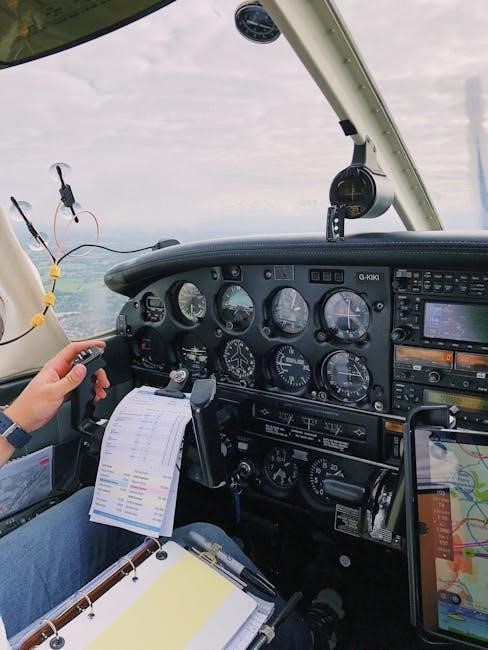The private pilot oral test is a critical component of the FAA checkride, assessing a pilot’s knowledge and understanding of aviation principles, regulations, and safety practices․
1․1 Overview of the Private Pilot Certification Process
The private pilot certification process is a comprehensive journey requiring candidates to demonstrate both flight proficiency and theoretical knowledge․ It begins with ground training, covering aviation regulations, weather, navigation, and aircraft systems․ Flight lessons focus on developing practical skills, from basic maneuvers to complex procedures․ The process culminates in the FAA Practical Test (checkride), which includes both an oral exam and a flight test․ The oral exam assesses the candidate’s understanding of aviation principles, while the flight test evaluates their ability to safely operate an aircraft․ Successful completion of both components results in the issuance of a private pilot certificate, granting privileges to act as Pilot in Command and carry passengers․
1․2 Importance of the Oral Exam in the Checkride
The oral exam is a pivotal part of the FAA checkride, serving as a comprehensive assessment of a pilot’s knowledge and decision-making abilities․ It evaluates understanding of aviation regulations, weather interpretation, navigation, and aircraft systems․ Unlike the written exam, the oral test allows the examiner to probe deeply into a candidate’s knowledge, ensuring they can apply theoretical concepts to real-world scenarios․ A strong performance demonstrates not only knowledge but also the ability to think critically and communicate effectively․ Preparation for the oral exam involves thorough review of the FAA ACS, focusing on high-risk areas such as emergency procedures and airspace regulations․ Success in the oral exam builds confidence and is essential for advancing to the flight test portion of the certification process․ Candidates must be well-prepared, as the oral exam sets the tone for the entire checkride experience․ Proper preparation ensures a smooth and successful evaluation, highlighting the candidate’s readiness to safely operate an aircraft and adhere to FAA standards․ The oral exam is not just a test of knowledge but a measure of a pilot’s ability to function effectively in various aviation environments․ By mastering the material and practicing with instructors, candidates can approach the oral exam with confidence, knowing they are well-equipped to handle the challenges of the checkride․ This thorough assessment ensures that only qualified individuals earn their private pilot certification, maintaining the safety and integrity of the aviation community․ Understanding the importance of the oral exam motivates candidates to dedicate time and effort to their preparation, ultimately leading to a successful outcome․ The examiners use the oral test to gauge a candidate’s problem-solving skills and their ability to operate safely and efficiently․ By focusing on key areas and practicing regularly, candidates can navigate the oral exam with ease, demonstrating their competence and readiness for the responsibilities of a private pilot; The oral exam is thus a critical hurdle in the certification process, ensuring that all private pilots meet the high standards set by the FAA․ Effective preparation strategies, such as reviewing the ACS and practicing with instructors, are essential for success․ Candidates who approach the oral exam with confidence and a thorough understanding of the material are more likely to achieve their goal of becoming a certified private pilot․ The oral exam is a fundamental step in the certification process, and its importance cannot be overstated․ It serves as a final verification of a candidate’s knowledge and readiness to assume the responsibilities of a private pilot․ By understanding the significance of the oral exam, candidates can better prepare and approach the checkride with the confidence and competence needed to succeed․ The oral exam is not merely a formality but a rigorous evaluation that ensures only the most qualified individuals earn their certification․ This emphasis on thorough preparation and comprehensive assessment underscores the importance of the oral exam in the overall certification process․ Candidates must recognize that the oral exam is an opportunity to demonstrate their mastery of aviation principles and their ability to apply this knowledge in real-world scenarios․ By doing so, they not only achieve their certification but also contribute to the safety and professionalism of the aviation community․ The oral exam is a vital component of the checkride, and its significance should not be underestimated․ Adequate preparation and a deep understanding of the subject matter are essential for success, ensuring that candidates are well-equipped to handle the demands of being a private pilot․ The oral exam serves as a final checkpoint, confirming that a candidate has acquired the necessary skills and knowledge to operate safely and effectively․ It is through this rigorous assessment that the FAA upholds the high standards of aviation safety and excellence․ Candidates who approach the oral exam with dedication and confidence are more likely to succeed, ultimately earning their private pilot certification and joining the ranks of competent and responsible pilots․ The oral exam is a critical evaluation that separates well-prepared candidates from those who require additional training․ It is a testament to the thoroughness of the certification process and the commitment to aviation safety․ By excelling in the oral exam, candidates demonstrate their readiness to take on the challenges of private piloting, ensuring that they are capable of making sound decisions and navigating the complexities of flight․ The oral exam is thus a cornerstone of the certification process, providing a comprehensive assessment of a candidate’s abilities and knowledge․ It is through this process that the FAA ensures that all private pilots are not only knowledgeable but also capable of applying that knowledge in practical situations․ The importance of the oral exam lies in its ability to evaluate both the depth of a candidate’s understanding and their ability to communicate effectively․ This dual assessment ensures that private pilots are both competent and articulate, qualities that are essential for safe and effective flight operations․ By understanding the significance of the oral exam, candidates can better prepare for this critical component of their certification journey․ Effective preparation involves not only memorization of facts but also the development of critical thinking and communication skills․ These skills are vital for success in the oral exam and beyond, as they enable pilots to navigate the dynamic and often unpredictable environment of aviation․ The oral exam is a challenging yet rewarding experience that pushes candidates to demonstrate their mastery of aviation principles․ It is through this process that the FAA identifies individuals who are truly ready to assume the responsibilities of a private pilot, ensuring the continued safety and excellence of the aviation community․ The oral exam serves as a final validation of a candidate’s hard work and dedication, confirming that they possess the knowledge, skills, and judgment necessary to operate an aircraft safely and efficiently․ By excelling in this exam, candidates not only achieve their certification but also gain the confidence and expertise needed to excel as private pilots․ The oral exam is thus a vital step in the certification process, one that demands thorough preparation and a deep understanding of aviation principles․ It is through this rigorous evaluation that the FAA maintains the high standards of the private pilot certification, ensuring that all certified pilots are capable of upholding the safety and professionalism expected in the aviation industry․ The oral exam is a critical component of the checkride, and its importance cannot be overstated․ It is through this assessment that the FAA verifies a candidate’s readiness to assume the responsibilities of a private pilot, ensuring that they are well-prepared to handle the challenges of flight․ By understanding the significance of the oral exam, candidates can approach it with the confidence and competence needed to succeed, ultimately earning their certification and contributing to the safety and excellence of the aviation community․ The oral exam is a rigorous and comprehensive evaluation that tests a candidate’s knowledge, critical thinking, and communication skills․ It is through this process that the FAA identifies individuals who are truly qualified to operate an aircraft and make sound decisions in various aviation scenarios․ The oral exam is not merely a formality but a vital step in ensuring that all private pilots meet the high standards set by the FAA․ By excelling in this exam, candidates demonstrate their commitment to safety and their ability to function effectively in the dynamic environment of aviation․ The oral exam is a challenging yet essential part of the certification process, and its importance should not be underestimated․ Candidates must approach it with thorough preparation and confidence, recognizing that it is a final verification of their knowledge and readiness to become a private pilot․ The oral exam is a cornerstone of the checkride, ensuring that only the most qualified individuals earn their certification․ It is through this process that the FAA upholds the integrity and safety of the aviation community, confirming that each certified pilot is capable of operating an aircraft with competence and responsibility․ The oral exam is a critical evaluation that separates well-prepared candidates from those who require additional training․ It is a testament to the thoroughness of the certification process and the commitment to aviation safety․ By excelling in the oral exam, candidates demonstrate their readiness to take on the challenges of private piloting, ensuring that they are capable of making sound decisions and navigating the complexities of flight․ The oral exam is thus a vital component of the certification process, providing a comprehensive assessment of a candidate’s abilities and knowledge․ It is through this process that the FAA ensures that all private pilots are not only knowledgeable but also capable of applying that knowledge in practical situations․ The importance of the oral exam lies in its ability to evaluate both the depth of a candidate’s understanding and their ability to communicate effectively․ This dual assessment ensures that private pilots are both competent and articulate, qualities that are essential for safe and effective flight operations․ By understanding the significance of the oral exam, candidates can better prepare for this critical component of their certification journey․ Effective preparation involves not only memorization of facts but also the development of critical thinking and communication skills․ These skills are vital for success in the oral exam and beyond, as they enable pilots to navigate the dynamic and often unpredictable environment of aviation․ The oral exam is a challenging yet rewarding experience that pushes candidates to demonstrate their mastery of aviation principles․ It is through this process that the FAA identifies individuals who are truly ready to assume the responsibilities of a private pilot, ensuring the continued safety and excellence of the aviation community․ The oral exam serves as a final validation of a candidate’s hard work and dedication, confirming that they possess the knowledge, skills, and judgment necessary to operate an aircraft safely and efficiently․ By excelling in this exam, candidates not only achieve their certification but also gain the confidence and expertise needed to excel as private pilots․ The oral exam is thus a vital step in the certification process, one that demands thorough preparation and a deep understanding of aviation principles․ It is through this rigorous evaluation that the FAA maintains the high standards of the private pilot certification, ensuring that all certified pilots are capable of upholding the safety and professionalism expected in the aviation industry․

Understanding the FAA ACS (Airmen Certification Standards)
The FAA ACS is a framework for airmen certification, integrating knowledge, skill, and risk management․ It ensures a consistent, systematic approach to training and testing․
2․1 What is the FAA ACS?
The FAA ACS (Airmen Certification Standards) is a comprehensive framework designed to integrate the knowledge, skills, and risk management required for airmen certification․ It replaces the Practical Test Standards (PTS) and outlines specific tasks, aeronautical knowledge, and flight proficiency standards․ The ACS ensures a consistent and systematic approach to training and evaluation, focusing on real-world scenarios and safety․ It emphasizes task-specific knowledge and the ability to apply it effectively․ By aligning training with certification requirements, the ACS helps ensure pilots meet the highest standards of competence and safety․ Its structured format makes it easier for instructors and examiners to assess a pilot’s readiness for certification․
2․2 How the ACS Applies to the Oral Exam
The FAA ACS provides a structured framework for the oral exam, ensuring candidates demonstrate both knowledge and practical application of aeronautical concepts․ Examiners use the ACS to assess a pilot’s understanding of critical areas, such as aircraft systems, weather, navigation, and regulations․ The ACS emphasizes task-specific knowledge and risk management, requiring candidates to explain how they would handle real-world scenarios․ This ensures the oral exam evaluates not just memorization but also the ability to apply knowledge safely and effectively․ By aligning the exam with the ACS, it guarantees a consistent and comprehensive assessment of a pilot’s qualifications, focusing on competencies essential for safe flight operations․

Key Areas of Focus for the Oral Exam
The oral exam focuses on regulations, weather, navigation, communication, aircraft systems, and performance, ensuring a comprehensive understanding of safe flight operations and effective decision-making skills․
3․1 Regulations and Privileges of a Private Pilot
The oral exam evaluates a candidate’s understanding of the regulations and privileges associated with holding a private pilot certificate․ This includes knowledge of Title 14 CFR Part 61 and Part 91, which govern pilot certification and general operating rules․ Key topics include privileges such as flying for personal use, carrying passengers, and operating in various classes of airspace․ Candidates must also understand limitations, such as not flying for compensation or in instrument meteorological conditions without an instrument rating․ Familiarity with airspace restrictions, weather minimums for VFR flight, and requirements for pre-flight and post-flight inspections is essential․ This ensures compliance with safety standards and legal obligations․
3․2 Weather and Meteorological Conditions
Understanding weather and meteorological conditions is critical for flight safety, and examiners often focus on this during the oral test․ Candidates must demonstrate knowledge of weather phenomena, including fog, icing, thunderstorms, and wind shear, and their impact on flight operations․ Familiarity with METARs, TAFs, and other weather reporting tools is essential․ Additionally, pilots should understand weather-related regulations, such as VFR weather minimums and the importance of obtaining accurate forecasts․ Recognizing adverse weather conditions and applying appropriate decision-making strategies is vital․ This section ensures pilots can interpret weather data and make sound judgments to ensure safe flight operations under various meteorological scenarios․
3․3 Navigation and Communication Procedures
Navigation and communication are fundamental skills assessed during the oral exam․ Pilots must understand how to use navigation aids like VOR, GPS, and sectional charts to determine position and course․ Knowledge of communication protocols, including standard phraseology and ATC interactions, is crucial․ Examiners may ask about procedures for contacting towers, approach controls, and FSS․ Understanding lost procedures, emergency communications, and the use of transponders is also essential․ Familiarity with airspace classifications and how they affect communication requirements is key․ Demonstrating the ability to navigate safely and communicate clearly ensures effective coordination with ATC and adherence to aviation regulations during flight operations․
3․4 Aircraft Systems and Performance
Aircraft systems and performance are critical areas of focus during the oral exam․ Pilots must demonstrate a thorough understanding of engine operation, fuel systems, electrical systems, and hydraulic systems․ Knowledge of propeller and landing gear systems is also essential․ Performance-related questions may cover topics like takeoff and landing distances, climb rates, and cruise performance․ Understanding how factors such as weight, altitude, and temperature affect aircraft performance is vital․ Examiners often ask about stall speeds, load calculations, and the impact of weather on performance․ Being able to explain how to optimize aircraft performance for different flight conditions ensures safe and efficient operation of the aircraft․

Common Questions Asked During the Oral Exam
The oral exam covers a wide range of topics, including airspace, weather, emergency procedures, navigation, and aircraft performance․ Questions focus on practical application and decision-making skills․
4․1 Questions on Airspace and Air Traffic Control
During the oral exam, expect questions about airspace classifications, such as Class G, Class B, and Class C airspace, and their specific requirements․ You may be asked to explain the differences between controlled and uncontrolled airspace, as well as the rules for operating in each․ Common topics include communication procedures with air traffic control (ATC), such as how to request clearances, obtain weather information, and handle emergency situations․ Be prepared to discuss your understanding of ATC instructions, like “squawk” codes, “hold short” commands, and taxi instructions․ Additionally, you may be queried on how to navigate through different airspaces safely and efficiently, ensuring compliance with regulations․ Practical scenarios, such as entering a Class D airspace or responding to ATC instructions, are often discussed to assess your decision-making skills․
4․2 Questions on Emergency Procedures
During the oral exam, you may be asked about various emergency procedures, such as engine failure, system malfunctions, or medical emergencies․ Be prepared to explain the steps for handling an engine failure, including identifying a suitable landing area and configuring the aircraft for a forced landing․ Questions may also cover emergency communication protocols, such as declaring an emergency with ATC or using Mayday procedures․ Knowledge of emergency checklists and how to prioritize actions is critical․ Additionally, you may be asked about procedures for dealing with weather-related emergencies, such as unexpected icing or thunderstorms․ Stay calm, recall your training, and demonstrate a logical approach to emergency scenarios․
4․3 Questions on Aircraft Performance and Limitations

Examiners often ask about your aircraft’s performance capabilities and limitations to ensure you understand its operational boundaries․ Be prepared to discuss climb rates, cruise speeds, and fuel efficiency under various conditions․ You may also be asked about the aircraft’s service ceiling, stall speeds, and maximum allowable weights․ Knowledge of how factors like altitude, temperature, and load affect performance is essential․ Additionally, questions may cover specific limitations, such as maximum manifold pressure, RPM settings, or oil temperature ranges․ Familiarity with the aircraft’s Pilot Operating Handbook (POH) is crucial, as it contains all performance data and limitations․ Clear, accurate answers demonstrate your ability to operate the aircraft safely and efficiently․

Preparation Strategies for the Oral Exam
Effective preparation is crucial for success in the oral exam․ Review the FAA ACS thoroughly, practice with a flight instructor, and use study guides and flashcards to reinforce key concepts․ This approach ensures a strong understanding and boosts confidence during the checkride․
5․1 Reviewing the FAA ACS and Other Resources
Thoroughly reviewing the FAA Airmen Certification Standards (ACS) is essential for oral exam preparation․ The ACS outlines the knowledge and skills required for certification, ensuring candidates understand the evaluation criteria․ Focus on the Private Pilot ACS, which covers areas like regulations, weather, navigation, and aircraft systems․ Supplement your study with the Pilot’s Handbook of Aeronautical Knowledge (PHAK), Aeronautical Information Manual (AIM), and relevant FAA advisory circulars․ Cross-reference these materials with study guides and online resources to reinforce concepts․ Regularly review and summarize key points to enhance retention and clarity․ This structured approach helps candidates align their knowledge with examiner expectations, ensuring a comprehensive understanding of critical topics․
5․2 Practicing with a Flight Instructor or Examiner
Practicing with a flight instructor or examiner is a highly effective way to prepare for the oral exam․ They can simulate real exam scenarios, helping you become familiar with the types of questions and the level of detail expected․ Conduct mock interviews where they ask questions and provide feedback on your responses․ This interaction helps identify knowledge gaps and improves your ability to articulate answers clearly․ Instructors can also share common pitfalls and offer tips for staying calm under pressure․ Regular practice sessions build confidence and ensure you’re well-prepared to address any topic the examiner might raise during the actual test․
5․3 Using Study Guides and Flashcards
Study guides and flashcards are invaluable tools for preparing for the private pilot oral exam․ They provide concise summaries of key topics, allowing you to review complex information quickly․ Flashcards are particularly useful for memorizing definitions, procedures, and regulations․ Organize them by topic, such as weather, airspace, or aircraft systems, to focus on specific areas․ Active recall, the process of actively remembering information, strengthens your understanding and retention․ Use study guides to reinforce concepts and ensure you cover all required subjects․ Flashcards can also be used during downtime, making them a flexible study option․ This method helps you identify weak areas and builds confidence for the exam․

Tips for Success During the Oral Exam
- Stay calm and confident, as nervousness can impair your ability to articulate answers clearly․
- Ask for clarification if unsure about a question to ensure accurate responses․
- Be honest about knowledge gaps, as transparency is valued by examiners․
6․1 Staying Calm and Confident
Staying calm and confident is crucial during the oral exam․ Nervousness can cloud your thoughts and hinder clear communication․ Take deep breaths before answering questions to maintain composure․ Positive self-talk and visualization of success can boost confidence․ Remember, the examiner wants to assess your knowledge, not intimidate you․ Preparation is key—knowing the material well naturally reduces anxiety․ If you feel overwhelmed, pause briefly to gather your thoughts before responding․ Confidence comes from being prepared and understanding that it’s a conversation, not an interrogation․ Stay focused, and let your knowledge shine through․
6․2 Asking for Clarification When Needed
Asking for clarification during the oral exam is a sign of a prepared and thoughtful candidate․ If a question is unclear, politely request more details to ensure you address it accurately․ For example, you might say, “Could you please elaborate on that?” This demonstrates your commitment to understanding and providing the best possible answer․ Avoid making assumptions, as misinterpreting a question could lead to an incorrect response․ Clarification helps ensure you stay on topic and showcase your knowledge effectively․ It’s better to ask than to risk answering incorrectly․ This approach also shows confidence and a willingness to engage in productive dialogue․
6․3 Being Honest About Knowledge Gaps
Being honest about knowledge gaps during the oral exam is crucial․ If you’re unsure or don’t know an answer, admit it rather than guessing․ This demonstrates integrity and a commitment to safety․ Examiners value candor, as it reflects a responsible attitude․ Saying, “I don’t know” or “I need to review that topic” shows self-awareness and a willingness to learn․ Misrepresenting knowledge can lead to unsafe practices, which is why transparency is essential․ Honesty builds trust with the examiner and underscores your dedication to becoming a competent pilot․ It’s better to acknowledge limitations than to provide incorrect information․

Real-Life Examples and Case Studies
Honesty about knowledge gaps shows maturity and a safety-first mindset, allowing examiners to pinpoint areas needing improvement․ Dishonesty risks safety and undermines trust․
7․1 Common Mistakes to Avoid
During the private pilot oral test, candidates often make avoidable mistakes that can negatively impact their performance․ One common error is inadequate preparation, leading to confusion during questioning․ Overconfidence can also be detrimental, as it may result in careless oversights․ Additionally, some candidates fail to thoroughly review weather services, airspace regulations, and aircraft performance data, which are frequently tested topics․ Others struggle with time management, rushing through answers or prolonging responses unnecessarily․ These mistakes underscore the importance of structured study habits, active listening, and clarity in communication․ By addressing these pitfalls, aspiring pilots can enhance their readiness and confidence for the oral exam․
7․2 Successful Strategies from Experienced Pilots
Experienced pilots emphasize the importance of organized preparation and focused study habits to excel in the private pilot oral test․ Many recommend simulating the exam environment through mock interviews with instructors, which helps build confidence and familiarity with the questioning style․ Additionally, pilots stress the value of understanding core concepts rather than memorizing facts, as this fosters clarity in explanations․ Regular practice sessions with a certified flight instructor or examiner are also highly recommended to refine communication skills․ Moreover, staying calm and composed during the exam is crucial, as nervousness can cloud thinking․ By adopting these proven strategies, candidates can significantly improve their performance and overall success in the oral test․

Final Checklist for the Oral Exam
- Review regulations and privileges․
- Understand weather and meteorology․
- Master navigation and communication․
- Know aircraft systems and performance․
- Practice emergency procedures;
- Organize study materials․
- Ensure all documentation is ready․

8․1 Key Topics to Review
Thoroughly review regulations and privileges of a private pilot, ensuring understanding of legal requirements․ Study weather principles, including forecasts and hazards․ Master navigation techniques and communication protocols․ Understand aircraft systems, performance, and limitations․ Practice explaining emergency procedures, such as engine failures or system malfunctions․ Review airspace classifications and interactions with ATC․ Be prepared to discuss flight planning, including weight and balance calculations․ Lastly, ensure familiarity with aviation weather services and decision-making processes․ These areas are critical for a successful oral exam․

